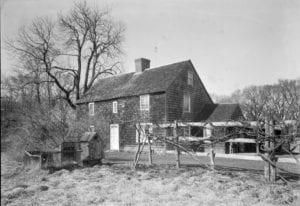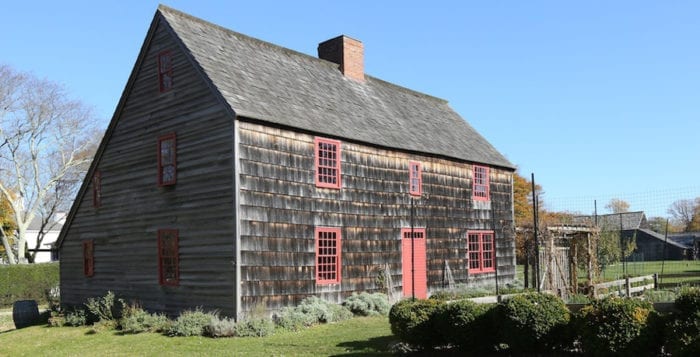By Nomi Dayan

Before George Washington, Paul Revere and Alexander Hamilton, the first – and feistiest! – patriots were none other than Long Island whalers. The first Colonists were English Puritans who arrived to the east end of Long Island in 1640. At the time, the area was considered an extension of Connecticut and New England – seen as remote and separate from the Dutch-ruled western end of Lange Eylant.
These pioneers were initially farmers, but they quickly became seasonal entrepreneurs after they noticed their enormous marine neighbors spouting by their shores: blubber-rich right whales.
Whaling companies were launched during the winter months, hunting whales in rowboats on frigid beaches with the labor of local Native Americans. In large iron trypots on the sand, whaling crews stewed blubber until it melted into liquid gold – whale oil. Whale oil was used chiefly for illumination, and later in time, for a variety of manufacturing purposes. Oil even served as a currency (local schoolteachers were paid in whale oil).
For the next 20 years, Colonists worked to perfect this trade. Whaling quickly became part of community life, with required whale-spotting shifts from able-bodied men. School even let out from December to April so children could help spot and process whales. Oil was shipped to New England rather than New Amsterdam to avoid Dutch taxes.
This trade route was suddenly halted when new commerce rules were set in place by England. The entire Long Island was now a part of New York. All goods were to be exported through New York City. The whale was a “royal fish,” from which the crown demanded a 20 to 50 percent tax. Eastenders were horrified.
The battle between whalers and England began. Whalers were outraged at taxation without representation – foreshadowing the defiant Boston Tea Party a century later. They rebelled by turning Long Island into a smuggler’s haven, avoiding taxes by continuing to ship their oil to Boston or New London.

A string of upset New York governors tried to enforce the tax – generally unsuccessfully. When the Duke of York investigated how many whales were caught in the past 6 years – and what his share was – he found no records had been kept. Lord Cornbury, a later New York governor, whined that “the illegal trade” was still carrying on between Long Island and New England.
With Colonists’ protests falling on deaf ears, the towns of East Hampton, Southampton and Southold bypassed the governor of New York and submitted a petition to the court of England to be made a free corporation or continue under Connecticut rule. Their detailed list of complaints is similar to the tune of complaints in the Declaration of Independence. Their plea was denied. Their solution? Ignore the whale tax anyway.
Colonists continued to smuggle the majority of oil to New England. New York merchants themselves were also flouting the law, which required all international trade to go through England. Instead, they traded directly with the West Indies, exchanging whale oil for rum, sugar and cocoa.
Taking international trade into their own hands, New Yorkers who felt particularly courageous loaded up their ships and sailed with their goods to Madagascar, where there was an anarchist colony of none other than – pirates! Doing business with pirates was highly profitable, since it was all tax free. An inspector noted that in 1695, Long Island “was a receptacle for pirates and the people generally a lawless and unruly set.”
Whalers continued to protest. One of the pluckiest whalers who objected to the whale tax was Samuel Mulford of East Hampton, who lived from 1644 to 1725. He was a bold and somewhat quirky fellow. He championed the cause of the whalers, himself a financially successful owner of a whaling company of 24 men.
Elected as a representative to New York Assembly in 1683, Mulford was expelled from the assembly twice for his outspoken demands; Colonists simply re-elected him and sent him back. When he sailed to London to protest the whale oil tax, he sewed fishhooks in his pockets to deter pickpockets during his long wait outside Buckingham Palace.
Ultimately, the crown eased taxation. Mulford didn’t get to see this victory, as this announcement came five years after his death. Encouragingly, various acts were passed by the British Parliament to support the lucrative whaling industry, but Colonists’ frustrations toward their relationship with England never really went away. During the Revolutionary War, which brought whaling to a standstill, locals repurposed whaleboats for guerilla warfare against British efforts.
After America won its independence, a new era opened for whaling. In 1785, The Lucy left Sag Harbor to whale offshore Brazil; she returned with an unprecedented 360 barrels of whale oil. Americans took notice. To encourage trade, George Washington then authorized the first lighthouse in New York State to be built, the Montauk Lighthouse. The hundreds of whaleships that followed The Lucy would have sailed home from their global voyages directed by this lighthouse – illuminated by none other than whale oil.
Nomi Dayan is the executive director at The Whaling Museum & Education Center.





